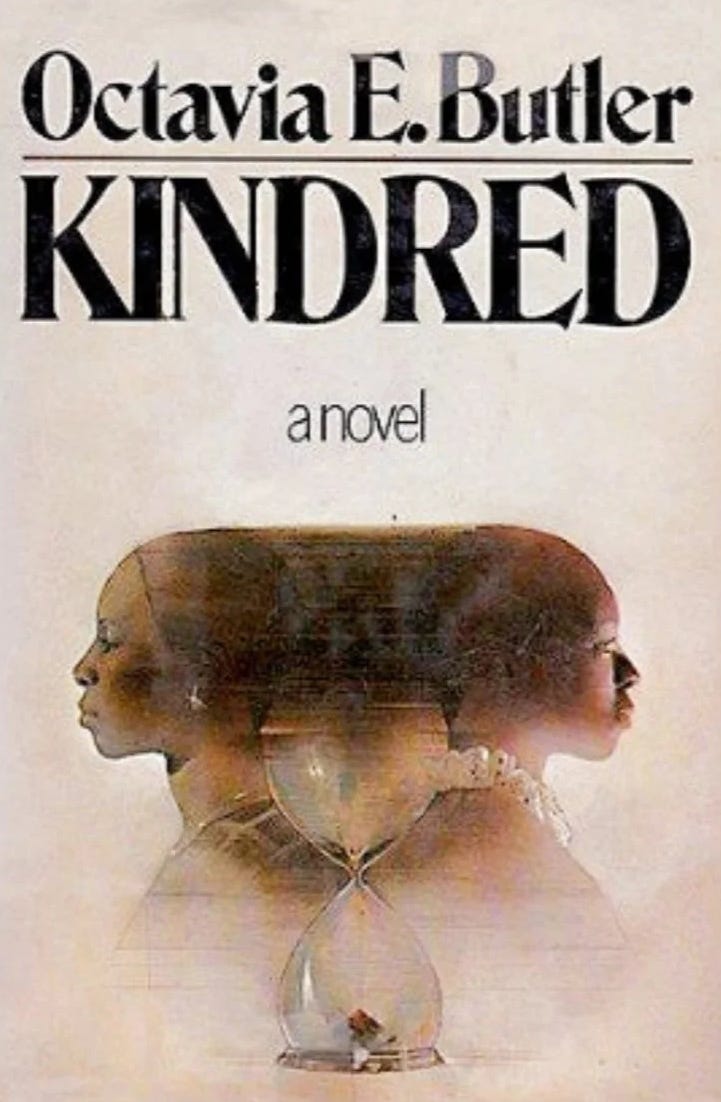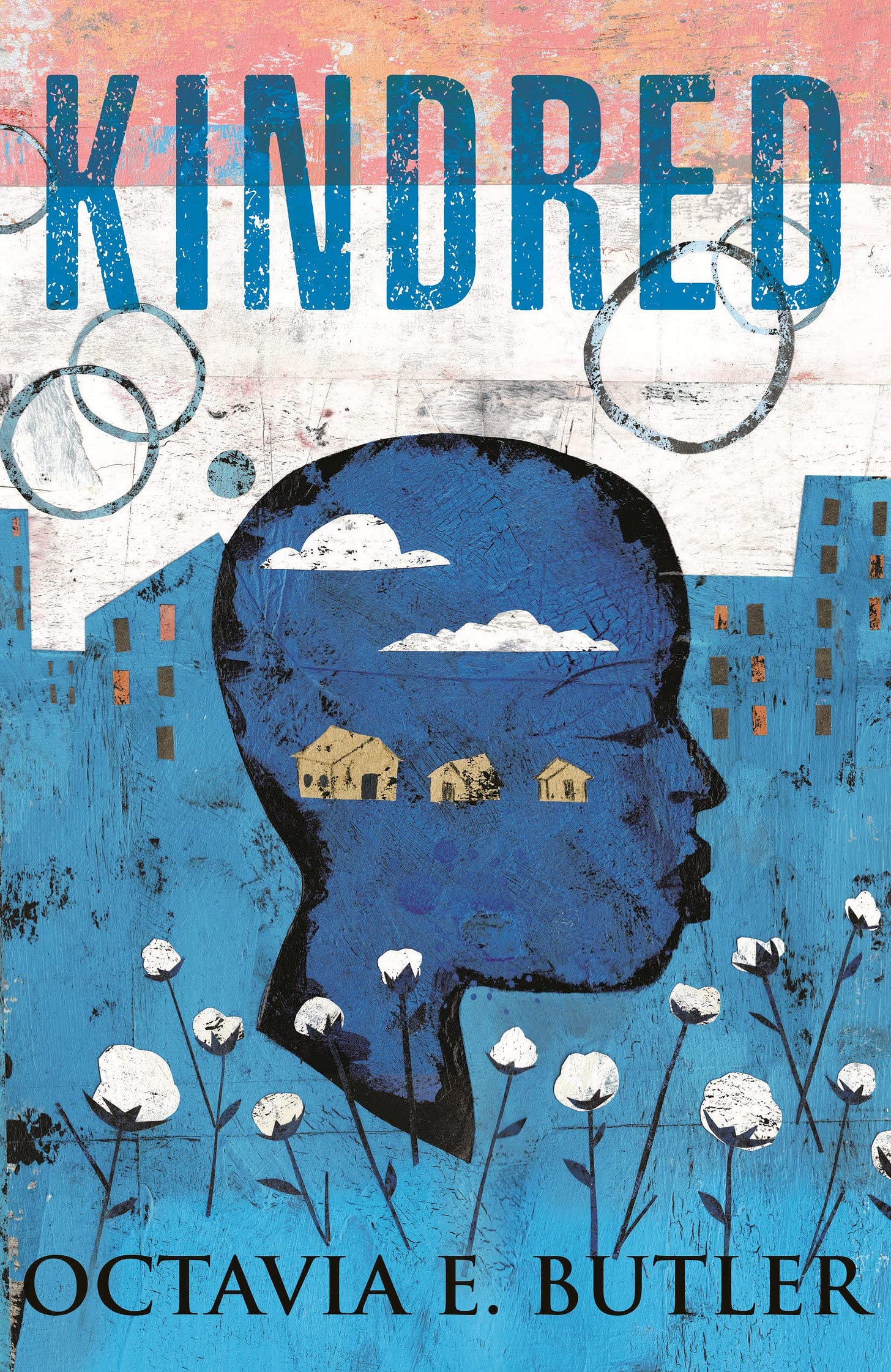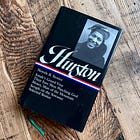Scars of the Past: Octavia Butler’s ‘Kindred’
Reviewing a Genre-Bending Modern Classic
When Dana Franklin arrives in the emergency room missing part of her arm, doctors and law enforcement assume her husband, Kevin, has maimed her. The truth is far more complicated.
Though the interracial couple lives in Los Angeles, in 1976 to be precise, Dana frequently travels to Maryland—not by car, bus, train, or plane. Mysteriously, she finds herself repeatedly summoned to an antebellum plantation in the early nineteenth century. As a black woman, the change of scenery is potentially lethal. But it’s not her life at risk, at least not initially.
The first time it happens Dana and Kevin have just married and set up house. Both writers, the couple are sorting and shelving books when Dana suddenly finds her new surroundings growing hazy; a moment later, as everything comes back into view, she’s no longer kneeling in her little home library. She’s beside a meandering river, where a red-headed white boy is drowning.
Dana leaps into action, swims to the boy, and drags him back to shore. Rufus—she soon picks up his name—has already taken on water and lost consciousness. Uncertain what else to do, Dana begins mouth-to-mouth resuscitation and revives him. The mother, rushing in, has no idea what’s happened but thinks Dana has killed her child; it’s clear a moment later that she has in fact saved his life. But in that chaotic swirl the father arrives and levels the muzzle of his rifle point-blank at Dana’s face.
As the hammer cocks, just as quick as she vanished, Dana returns. She’s back in LA with an experience she could barely explain.
‘I Had One Choice’
In 1954 a twelve-year-old Octavia Butler sat before a TV screen absorbed in a B-grade sci-fi flick, Devil Girl from Mars. It was a fateful catalyst. “The movie was just bad enough to disgust me and make me believe that I could easily write a better story,” she told Thrust magazine in 1979.
Butler had some reason for her confidence. She began writing stories several years before, shortly after beginning to read novels for herself. The only child of a widowed woman who worked as a domestic, Butler dreamed of becoming a writer. “I think I had one choice,” she said, then corrected herself, “well, two choices. I could become a writer, or I could die really young. Because there wasn’t anything else that I wanted.”
Her early stories weren’t much better than Devil Girl from Mars, but she persisted despite discouraging teachers (“Can’t you write anything normal?”), relatives who didn’t understand (“Negroes can’t be writers,” her aunt told her), and an industry that looked nothing like her (sci-fi was dominated by white men).
The persistence paid off. In 1970, she garnered a coveted spot at the Clarion Workshop for science-fiction writers in Clarion, Pennsylvania. Butler found it hard to fit in; she was the only African American in the group, one of only a handful of women, and she struggled being away from her mother. But the experience challenged her and opened at least one very helpful door: an editor from Doubleday attended and saw promise in her work.
It took another five years, but that connection paved the way for her first few novels, including Kindred, published in 1979.
Crooked Family Tree
Dana’s return to Los Angeles isn’t permanent, alas. She finds herself called back to Maryland again, this time to the plantation house belonging to the boy’s family. Rufus has accidentally set fire to the curtains in his room, and Dana arrives just in time to prevent the house from catching fire. No hysteric mother or violent father interrupt her this time, and she has a chance to talk to the boy.
Was he somehow summoning her?
Eventually, Dana realizes the answer is yes. Whenever Rufus’s life is threatened, the danger calls Dana to his aid. Similarly, whenever her own life is threatened, she’s whisked back to the safety of the present. The primary drama of the story involves Dana’s ping-ponging through time to save Rufus’s hide.
Why this connection to the boy? A genealogy inked in Dana’s family Bible reveals the unsettling answer. Through a union with a slave named Alice, a child named Hagar is born. That child is Dana’s great-great-something grandmother; Dana doesn’t exist unless Hagar is born, which means she doesn’t exist unless Rufus lives long enough to father that child—consensually or not. So, to ensure her own future, Dana has to keep a white slaver alive and more besides.
Dana’s arrival in Rufus’s world happens in quick succession from the vantage of the present, but long years stretch in between for Rufus. Consequently Dana’s able to meet her wayward ancestor at many moments of his life on his way to maturity. And given the mysterious power she possesses, some of which she’s able to reveal to him, he treats her differently than other blacks on his property. He listens to her, responds to her chastisement; Rufus realizes he needs Dana. And Dana, of course, needs Rufus. While working within the constraints of the situation, she tries to urge Rufus towards some sort of moral goodness, some sort of decency.
Along the way to seeing Hagar born, Dana learns the ways of plantation life, picking up the skills needed to function and survive. Kevin inadvertently joins her on one voyage and gets lost in the nineteenth century. When Dana returns to find him, years have elapsed for Kevin while only hours passed for her. He’s psychologically scarred by having to cope in a world so brutal and bigoted. What chance does Rufus have?
His journey toward uprightness and rectitude is far from assured, and Dana begins to fear the worst when he lies to her. Rufus always has his reasons for his behavior, and those reasons meander and bump into understandability often enough that Dana cuts him slack and hopes for the best. But she comes to learn Rufus can’t be trusted.
With such a realization, how can she countenance the union between Rufus and Alice? As their heir, how can she not?
Complications
The idea for Kindred came to Butler in college while wrestling with these very sorts of complications. She heard strident voices dismiss the contributions made by black ancestors as if they weren’t sufficiently radical enough and therefore abetted the systems designed to exploit them. Butler understood where these detractors were coming from but couldn’t go along. Life was too difficult for such easy judgements—especially from the vantage of the present.
“Every now and then I hear about younger kids reading it [Kindred] and I wonder how they relate to it,” she said in an Inmotion magazine interview.
All too often, especially young men, will feel, “Oh, if it was me, I would just,” and they have some simple solution that wouldn’t work at all and would probably get them killed. Because they don’t really understand how serious it is when the whole society is literally arrayed against you and arrayed to really keep you in your place. If you get seriously out of line they will kill you because they fear you.
Butler tried to introduce modern readers to that experience, to make it palpable and every bit as problematic as those who came before would have known it to be. That meant an authentic portrayal of the past, which would prove challenging for a young woman from Pasadena—a hundred and fifty years and three thousand miles away from the time she describes.
Science fiction pointed her toward the answer. “I didn’t know how to write Kindred or even how to research it,” she said in a note, unearthed by journalist Lynell George from Butler’s personal files. “The idea intimidated me. Finally decided out of my SF background to take history—the past—[and use it] as another planet. The past offers us the only other worlds we know to be inhabited . . . by humans. It presents us with people almost, but not quite like ourselves.”
The library offered the raw materials needed to build the world. Butler found the work depressing but she dove into slave narratives and other historical accounts. She was looking to fashion a picture of the past with purchase on the present. Even details as small as how clothes were laundered on plantations found their way into the story, siphoned off books from her local library.
So did her own experience. Butler’s mother worked as a domestic, and as a little girl Butler saw how she was treated by her employers. “I got to see her not hearing insults and going in back doors, and even though I was a little kid, I realized it was humiliating,” she said. “I knew something was wrong, it was unpleasant, it was bad.” She also came to recognize that her mother was a hero, someone who navigated her impossible situation with grace and determination; there were lessons there.
Butler plunged herself into the world. “I . . . found myself examining my own feelings about slavery—not what it was like for my ancestors, but what it might be like for me. How could slavery reshape her emotionally? Would the compromises, the capitulations she would have to make destroy her? If not, why not?”
All of that finds its way into the story through Dana’s connection to Rufus.
Unavoidable Scars
With Hagar finally born, Dana’s work in the past is done; her line is secure. But Rufus isn’t done with her. Alice, brutalized by bondage and Rufus’s unslackening claims on her life, exercises the only freedom she really has—to tragic result.
Unmoored and increasingly unhinged, Rufus then turns his twisted affections toward Dana. While she begins with hopes that Rufus will reform and transcend the trajectory of his family, it’s clear he wont. When that reality turns from conceptual to violent, she reacts the only way she can: with a knife.

The act severs her mysterious tie to the past and she’s thrust forward in time—but not all of her makes it back. That arm. “I couldn’t let her come back whole,” said Butler in a Callaloo interview. “Antebellum slavery didn’t leave people quite whole.”
The novel doesn’t leave readers unaffected either. How did Dana act? Was it legitimate? Would we—would you—have done differently? How? Why? Dana’s forced to repeatedly save Rufus’s life so she can save her own. Slavery required unthinkable compromises from its victims. Butler’s Kindred drops readers into the bind, maneuvered into the position where easy answers neither save nor serve. We may not be scarred by the experience, but we are marked nonetheless.
Thanks for reading! If you enjoyed this post, please hit the ❤️ below and share it with your friends.
Not a subscriber? Take a moment and sign up. It’s free for now, and I’ll send you my top-fifteen quotes about books and reading. Thanks again!
Related posts:
And tour my new book, The Idea Machine, out tomorrow!








I had the privilege of hearing her speak at Butler University in the late 90’s at their Visiting Writers Series. She was an imposing figure - tall and deep-voiced. It was something I’ll never forget.
Done - immediately borrowed from the library! Thanks for the introduction to another author.